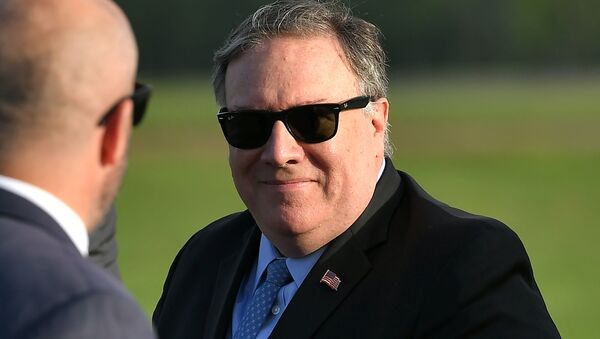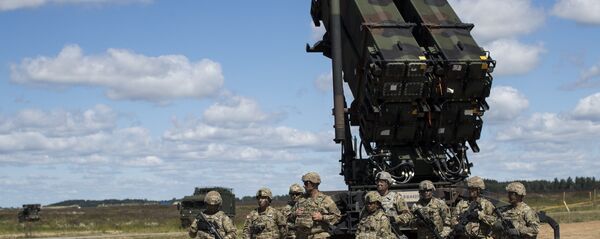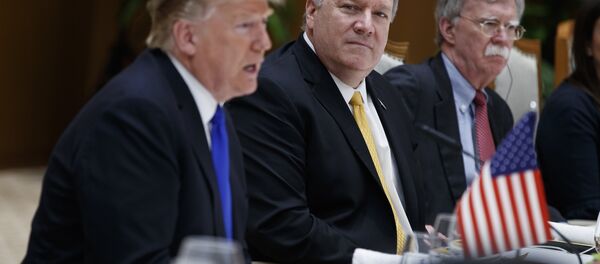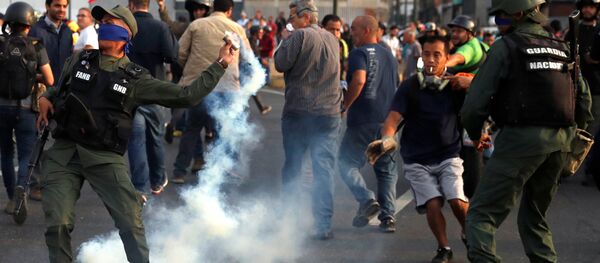Pompeo noted that he sees increased threats from Iran and that President Donald Trump's administration is reinforcing its capacity to respond to any offensive action from Iran. And that was the reason why the US decided to deploy a carrier strike group and a bomber task force, according to Pompeo.
"We've done all the right things to increase our security posture to the best of our ability," Pompeo said, "but we also want to make sure that we had deterrent forces in place, so in the event that Iran decides to come after an American interest — whether that be in Iraq, or Afghanistan, or Yemen, or any place in the Middle East — we are prepared to respond to them in an appropriate way. "
At the same time, Pompeo argued that despite the greater military presence the US has in the Middle East, Washington isn't looking for a fight.
"We're not going to miscalculate: Our aim is not war, our aim is a change in the behaviour of the Iranian leadership. We hope the Iranian people will get what they finally want, and what they so richly deserve," he said. "The forces that we're putting in place, the forces that we've had in the region before — you know, we often have carriers in the Persian Gulf — but the president wanted to make sure that, in the event something took place, we were prepared to respond to it in an appropriate way."
However, the diplomatic resolution apparently is not the only option, as Pompeo elaborated further.
"An attack on American interests from an Iranian-led force, whether it's Iranian proper or it's an entity that is controlled by the Iranians, we will hold the responsible party accountable. President Trump has been very clear about that: Our response will be appropriate." "Iran is the major destabilizing influence in the Middle East, and we aim to fix that."
Pompeo claimed that the US aims at targeting exclusively the country's establishment, having no intention to hurt people.
"These sanctions are directed at the Iranian leadership to change their behaviour — point blank, point blank," the American official said. "The Iranian leadership understands the cost that is being imposed. This is a kleptocratic regime that has stolen billions of dollars and wastes the Iranian people's own money on these proxy wars all across the world."
"Of course we would welcome that call. Of course, we want a peaceful diplomatic resolution to each of these conflicts that we've talked about here today," he told CNBC. "That makes perfect sense."
READ MORE: Bolton Held ‘Rare' Meeting on Iran With Top Intel, DoD Advisers at CIA — Reports
Washington is currently waging a pressure campaign against Iran, the recent developments of which include deployment of the carrier strike group and the bomber task force in the region, designating Iran's Islamic Revolutionary Guard Corps (IRGC) as a foreign terrorist organization and a toughening of sanctions against Iranian iron, steel, aluminium and copper.
In response, Tehran announced Wednesday that it plans to suspend some of its commitments under the Joint Comprehensive Plan of Action nuclear deal, with Iranian president Hassan Rouhani saying that the collapse of the deal would be dangerous for the country and the whole world. Rouhani sent a letter to the signatory states, informing them they have 60 days to return to the negotiating table to ensure Iran's interests are still protected by the agreement.
Trump Has Tougher Stance on Russia Than Any US President
"The actions that this administration takes I would put up against any in terms of our seriousness in pushing back on Russia and raising costs for them," Pompeo told the CNBC broadcaster.
The secretary of state noted that Moscow and Washington managed to cooperate in a number of issues, including Syria and Afghanistan.
"There are places that we'll have a value set that is radically different, that we'll have different views. In those places we're going to protect America's interests. But in those places where we can find common ground or an overlapping interest, it's completely appropriate, and, indeed, my duty and a necessity, that we work together," he explained.
The Venezuelan issue, which is a point of disagreement between Russia and the United States, is more complex, Pompeo added.
Earlier in the day self-proclaimed interim president Juan Guaido said that he asked his envoy to the United States to meet with Department of Defence officials to "cooperate" on a solution to the Venezuelan political crisis. The development came after a failed coup attempt which took place on 30 April and Guaido's subsequent statement that he would "perhaps" agree to US military intervention if it would help resolve the political crisis in his country.
READ MORE: Juan Guaido Seeks to Establish 'Direct Relationship' With Pentagon
The crisis in Venezuela began when opposition leader Juan Guaido proclaimed himself Venezuela's interim president on 23 January, two weeks after President Nicolas Maduro's inauguration for a second term in May 2018.
Russia, Bolivia, China, Cuba, Turkey and a number of other countries have voiced their support for constitutionally-elected Maduro as the only legitimate president of Venezuela.
White House officials have repeatedly warned Russia to leave Venezuela while Moscow accused Washington of illegally interfering in the South American's country's internal affairs.







